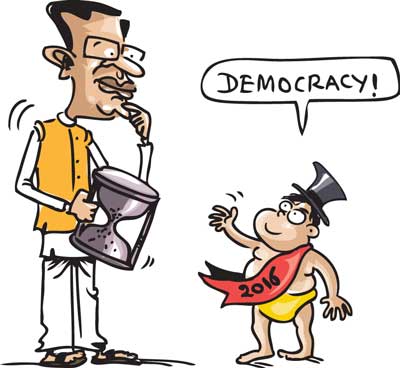Reply To:
Name - Reply Comment
In a significant move, the National Christmas Festival for the first time was held in Jaffna last Sunday and President Maithripala Sirisena -- the first Head of State to preside at such a festival -- pledged that the National Government would within six months find a just and fair solution to the issues concerning tens of thousands of displaced families.

The President, in his speech telecast live to millions of people in all parts of the country, said he and the Government were committed to reconciliation and a lasting peace, rehabilitation and restitution. He said priority would be given to the basic needs of the people -- such as means for livelihood, healthcare and education -- to restore their human dignity as fully-fledged citizens with equal rights. Mr. Sirisena, who at the January 8 presidential election received nearly 80% of the votes from the Tamil community and other minorities, reiterated the Government’s commitment to rebuild a multi-ethnic, multi-religious and multi-cultural society based on respect for plurality and diversity. The President warned that extremism or bigotry on any side -- be it the north or the south --would not be tolerated.
He charged that some anti-Government factions -- apparently referring to a group loyal to former president Mahinda Rajapaksa -- were attempting to topple the Government through some sort of a coup. The President said he and the Government had been elected to power by the sovereign people who alone had the power to elect or depose a Government. Thus no one and no group would be allowed to resort to extra-parliamentary methods as some were trying to do on the basis that national security was under threat. The President said there was no threat to national security and in contrast the National Government had strengthened national security through different means including the improvement of Sri Lanka’s diplomatic ties with the international community ranging from the United States and the European Union to India and China.
According to Government leaders, a draft constitution intended to consolidate parliamentary democracy and devolve powers to provincial and village levels is to be presented as a New Year gift to the country. A constitutional assembly is to be set up for a debate and dialogue on the draft constitution, before it is put for approval by Parliament and if necessary, approval by the people at a referendum. Reports say that the pro-Rajapaksa group comprising about 45 UPFA MPs as shown in last Saturday’s vote after the third reading of the 2016 budget is likely to oppose the resolution to turn Parliament into a constitutional assembly. The group says that while the UNP might have obtained a mandate from the people to change the Constitution, the SLFP had not. But analysts point out that President Maithripala Sirisena, who is also the leader of the SLFP and the UPFA, had at the January 8 presidential election obtained a mandate to abolish the executive presidential system and work out a new Constitution.
Clearly the SLFP and the UPFA are split virtually down the middle. Insiders say the pro-Rajapaksa group is likely to from a separate party for the upcoming local council elections. Prime Minister Ranil Wickremesinghe told Parliament the Government intended to hold local council elections as scheduled before the National New Year in April. But pro-Sirisena SLFP spokesmen have said that the elections are likely to be delayed due to issues over delimitation of wards, though some analysts say the main factor is the SLFP-UPFA split which might mean a UNP victory in most local councils.
President Sirisena said recently Sri Lanka could not have two presidents, an apparent reference to Mr. Rajapaksa. Analysts say the SLFP and the UPFA also cannot have two leaders. Therefore President Sirisena needs to crack the whip and insists that disciplinary action would be taken against SLFP/UPFA MPs who do not accept official party policy. This is the era when the National Government with a solid two thirds majority in Parliament needs to stand firm in building a new Sri Lanka on the foundations of good governance, social justice, democracy and adjust political solution to the ethnic conflict in economic terms populist measures and subsidies cannot and must be continued if a solid foundation is to be laid to rebuild Sri Lanka as a model for Asia.